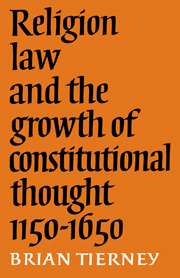Book contents
- Frontmatter
- Contents
- Dedication
- Preface
- I Introduction
- II Juridical foundations: society, church, and law, 1150–1250
- III Origins of jurisdiction: hierarchy and consent, 1250–1350
- IV Popular sovereignty, federalism, and fundamental law: Azo to Althusius
- V Corporate rulership and mixed constitution
- VI Conclusion
- Select bibliography
- Frontmatter
- Contents
- Dedication
- Preface
- I Introduction
- II Juridical foundations: society, church, and law, 1150–1250
- III Origins of jurisdiction: hierarchy and consent, 1250–1350
- IV Popular sovereignty, federalism, and fundamental law: Azo to Althusius
- V Corporate rulership and mixed constitution
- VI Conclusion
- Select bibliography
Summary
The main themes of this little book can be summed up in a couple of sentences. First: It is impossible really to understand the growth of Western constitutional thought unless we consider constantly, side by side, ecclesiology and political theory, ideas about the church and ideas about the state. And, second: It is hardly possible to understand unless we consider the whole period from 1150 to 1650 as a single era of essentially continuous development.
These are not new or startling thoughts; but they are not quite universally taken for granted among modern scholars. A few historians still feel able to reconstruct the political theory of the fifteenth century without any reference to the great struggle over the constitution of the church which was taking place in that era, and to argue that a doctrine of the constitutional state could emerge only when (and because) civic humanists turned their backs on the whole thought-world of the Middle Ages. I want to suggest on the contrary that the juridical culture of the twelfth century – the works of the Roman and canon lawyers, especially those of the canonists where religious and secular ideas most obviously intersected – formed a kind of seedbed from which grew the whole tangled forest of early modern constitutional thought.
Many older historians emphasized one or the other of my basic themes. The Carlyles, in their standard history of medieval political thought, observed that ‘The Renaissance may or may not represent a really new beginning in philosophy and science, it did not do so in political ideas.’
- Type
- Chapter
- Information
- Publisher: Cambridge University PressPrint publication year: 1982
- 1
- Cited by

